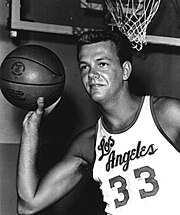Rod Hundley
| Rod Hundley | ||

|
||
| Player information | ||
|---|---|---|
| Full name | Rodney Clark Hundley | |
| Nickname | Hot rod | |
| birthday | October 26, 1934 | |
| place of birth |
Charleston , West Virginia , United States |
|
| date of death | March 27, 2015 | |
| Place of death | near Phoenix , Arizona , United States |
|
| size | 195 cm | |
| position | Guard | |
| college | West Virginia University | |
| NBA draft | 1957 , 1st pick, Minneapolis Lakers | |
| league | NBA | |
| Jersey number | 33 | |
| Clubs as active | ||
| 1957–1960 Minneapolis Lakers 1960–1963 Los Angeles Lakers |
||
Rodney Clark "Hot Rod" Hundley (born October 26, 1934 in Charleston , West Virginia , United States ; † March 27, 2015 near Phoenix , Arizona ) was an American basketball player for the Minneapolis Lakers and the Los Angeles Lakers in the NBA and longtime basketball commentator for the home games of the Lakers, Phoenix Suns and Utah Jazz and the US channels ABC and CBS . The 1.95 meter tall Hundley was considered one of the greatest college players of his generation during his time at West Virginia University (WVU).
biography
Rod Hundley was born in poor conditions in 1934. He sought refuge in basketball and soon established himself as a great talent with his throwing accuracy and his then new type of dribbling (including behind his back, through the legs or with both hands). With the West Virginia Mountaineers Hundley broke several points records in college, became a crowd favorite with his style of play and good looks and is still considered the greatest basketball player from West Virginia after Jerry West . This is also where his nickname "Hot Rod" (German: "Daredevil") was born. Following his WVU career, Hundley was inducted into the WVU Hall of Fame.
Hundley was then drawn to position 1 by the Minneapolis Lakers in the 1957 NBA draft. He became part of the Lakers, who almost went bankrupt in Minneapolis, then moved to Los Angeles and failed with winger Elgin Baylor several times in the NBA Finals at the Boston Celtics . In the NBA Hundley made two All-Star nominations, but was considered an eternal talent, as he did not take training seriously and was increasingly pushed to the bench by his builder Jerry West, who was also a WVU player. Nevertheless, Hundley 1962 almost decided the decisive 7th game of the 1962 NBA Finals against the Celtics: one second before the end he had a chance to throw in the event of a tie, instead matching his better positioned teammate Frank Selvy, who missed the basket. The Lakers eventually lost in overtime, which Hundley grieved for his life. At the age of 28, Hundley quit after having knee problems. He was offered the opportunity to comment on the Lakers games on the radio, stopped smoking overnight for the sake of his voice, and became a respected commentator with the Lakers and later with the Phoenix Suns, Utah Jazz and the sports channels CBS and ABC . Hundley commented on the jazz games for over 30 years before retiring in 2009. Jazz honored him for his services with a banner showing a microphone under the roof of the venue.
Private life
Hundley married his college girlfriend while at WVU, but divorced two years later. A Lakers professional, he married Florence Pellman and had three daughters with her, but separated from her in 1974 (but without divorcing). Hundley was the son of pool player Butch and casual worker Corrine Hundley. As a child, he was sent from one foster family to another and was often ignored or abused. According to his own statements, he suffered from tremors in his childhood and was a bed wetter. With no real caregivers, he became a drinker, smoker and womanizer who soon lost sight of his parents until Corrine saw her son again shortly before her death. Hundley saw his father a few times without wanting to reestablish contact. According to his own statement, Hundley suffered from inability to develop relationships throughout his life, but after his playing career he always tried to maintain a good relationship with his partner and children.
Hundley died at the age of 80 from complications from Alzheimer's disease , which he struggled with in the last few years of his life. Hundley last lived in Salt Lake City with his girlfriend Suzette .
Books
There are two works of literature about Hundley. Sports journalist Bill Libby published Hundley's biography Clown: Number 33 in Your Program, Number 1 in Your Heart - Hot Rod Hundley (Cowles, New York NY, ISBN 0-402-12571-1 ) in 1970 , and Hundley himself published it in October 1998 his book Hot Rod Hundley "You Gotta Love It, Baby" (Sports Pub Inc., Champaign IL, ISBN 1-57167-243-5 ), which reproduces anecdotes from the NBA from his players 'and commentators' point of view.
Web links
- Rod Hundley - player profile on basketball-reference.com
- Nine page Deseret News article on Hundley's Life (2003)
- Hundley in the WVU Hall of Fame
- nba.com article on Hundley's legendary no-throw in Game 7 of the 1962 NBA Finals
- Legendary Utah Jazz announcer 'Hot Rod' Hundley Dies
Individual evidence
| personal data | |
|---|---|
| SURNAME | Hundley, Rod |
| ALTERNATIVE NAMES | Hundley, Rodney Clark; Hot rod |
| BRIEF DESCRIPTION | American basketball player |
| DATE OF BIRTH | October 26, 1934 |
| PLACE OF BIRTH | Charleston , West Virginia |
| DATE OF DEATH | March 27, 2015 |
| Place of death | near Phoenix , Arizona |
